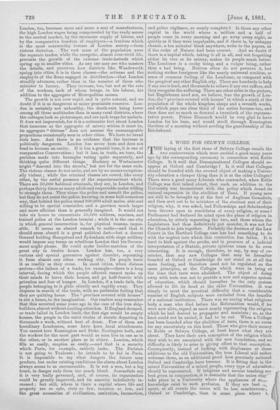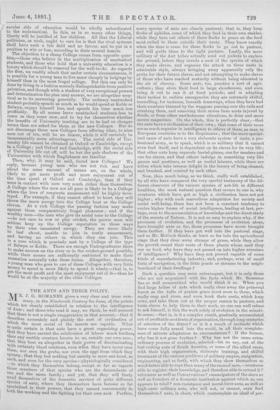A WORD FOR SELWYN COLLEGE.
THE laying of the first stone of Selwyn College recalls the two controversies which were excited a good many years ago by the corresponding ceremony in connection with Keble College. Is it well that Denominational Colleges should re- appear at Oxford and Cambridge ? Is it well that Colleges should be founded with the avowed object of making a Univer- sity education a cheaper thing than it is at the older Colleges? There were a good many Liberals who contended, when Keble College was first talked about, that such an addition to the University was inconsistent with the policy which found its natural expression in the abolition of Tests. If young men are still to be brought up at the feet of Anglican Gamaliels, and then sent out to be ministers of the straitest sect of their religion, why, it was asked, had Fellowships and Scholarships been thrown open to candidates of every religion, or none ? Parliament had declared its mind upon the place of religion in education, by utterly separating the two, and those whom the Legislature had thus definitively put asunder, it was not for the Church to join together. Probably the decision of the Law Courts in the Hertford College ease has had something to do with the neglect into which this contention has fallen. It is hard to kick against the pricks, and in presence of a judicial interpretation of a Statute, private opinions cease to be even interesting. It is enough, therefore, to say, by way of re- minder, that any new Colleges that may be hereafter founded at Oxford or Cambridge do not stand on at all the same footing, and therefore need not be regulated on the same principles, as the Colleges which were in being at the time that tests were abolished. The object of doing away with tests was not to provide a new and superior system of education, which should hereafter be the only system allowed to lift its head at the older Universities. It was simply to meet the practical difficulty that a considerable number of English subjects were excluded from the benefits of a national institution. There was no saying what religious body a man who died before the Reformation would, if he were now alive, regard as most nearly representing the religion which he had desired to propagate and maintain ; so, as the knot could not be untied, it had to be cut. When a College has been founded after the abolition of tests, there is no room for any uncertainty on this head. Those who give their money to Keble or Selwyn College, at least know what they are about. They have their own conception of the religion which they wish to see associated with the new foundation, and no difficulty is likely to arise in giving effect to that conception. Consequently, instead of looking with displeasure at these additions to the old Universities, the true Liberal will rather welcome them, as an additional proof how genuinely national Oxford and Cambridge have become. It is fitting that in the mixed Universities of a mixed people, every type of education, should be represented. If religious and secular teaching are best given in conjunction, it is desirable that the union shoe' take place in a University where the appliances of sees° knowledge exist in such profusion. If they are best ts, apart, at all events the union will be less mischievous;, Oxford or Cambridge, than in some place where t.
secular side of education would be wholly subordinated to the ecclesiastical. In this, as in so many other things, liberty will be justified of her children. All that the Liberal politician, as such, ought to care for is that the rival systems shall have each a fair field and no favour, and be put in a position to win or lose, according to their several deserts. The objection to a cheap College comes from opposite quar- ters,—those who believe in the multiplication of unattached students, and those who hold that a university education is a luxury which should be reserved for the well-to-do. As regards the first, we readily admit that under certain circumstances, it is possible for a young man to live more cheaply in lodgings by himself than in the most frugal college. But this can only be done by living in a fashion scarcely distinguishable from positive
privation, and though with a student of very exceptional powers and determination the plan may answer, we are altogether scep- tical as to its answering generally. The ordinary unattached student probably spends as much as he would spend at Keble or Selwyn, enjoys himself less, and spends his time much less profitably. By all means leave unattached students free to come as they come now, and to try for themselves whether the benefits of University teaching are to be had on cheaper terms than are asked for them at the new Colleges. But do not discourage these new Colleges from offering what, to nine men out of ten, will be no dearer, while it will certainly be immeasurably more advantageous. The social side of Uni- versity life cannot be obtained at Oxford or Cambridge, except in a College ; and Oxford and Cambridge, with the social side of University life cut off, will be but the pale shadows of the Universities with which Englishmen are familiar.
Then, why, it may be said, found new Colleges ? We reply, because young men who are not rich and have about the same amount of means are, on the whole, likely to get more profit and more enjoyment out of the time spent at Oxford and Cambridge, than if they were in contact with men very much richer than themselves. A College where the men are all poor is likely to be a College where the love of corporate amusement will be highly deve- loped. For example, if they cannot afford to hunt, they will throw the more energy into the College boat or the College eleven. At a rich College the passing fashion may make against these comparatively frugal pleasures ; and if the wealthy men—the men who give its social tone to the College —do not care to row or play cricket, the poorer men will seldom keep up the College reputation in these ways by their own unassisted energy. They are more likely to loaf about, unable to join in costly amusements, and having no others in which they can join. This is a case which is precisely met by a College of the type of Selwyn or Keble. There are enough Undergraduates there to make success on the river or in the cricket-ground possible, while their means are sufficiently restricted to make their recreation naturally take these forms. Altogether, therefore, a young man who goes to one of these Colleges with very little money to spend is more likely to spend it wisely—that is, to get the most profit and the most enjoyment out of it—than he would be at the majority of the older Colleges.



































 Previous page
Previous page